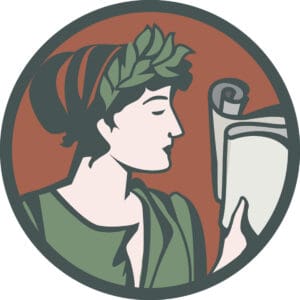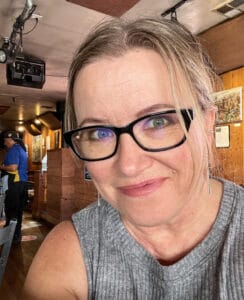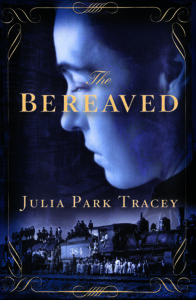 Julia Park Tracey is one of Alameda’s three-name luminaries—along with Frederica von Stade and Marilyn Ezzy Ashcraft, among others—and if like me you dream or dreamt of a life in letters, you count yourself lucky in knowing this remarkable writer. Journalist, novelist, editor, poet, person, Julia has been the engine for some of the best pages printed in this town, and all around. She was the founding editor of the Alameda Sun and the literary magazine Red Hills Review and is board member at large and unofficial muse for this publication, the Alameda Post. Most recently Julia has become executive editor for Sibylline Press, which celebrates and supports the writing of women over the age of 50. And being kind to an old friend, she’s consented to reply to 5Q4: Julia Park Tracey.
Julia Park Tracey is one of Alameda’s three-name luminaries—along with Frederica von Stade and Marilyn Ezzy Ashcraft, among others—and if like me you dream or dreamt of a life in letters, you count yourself lucky in knowing this remarkable writer. Journalist, novelist, editor, poet, person, Julia has been the engine for some of the best pages printed in this town, and all around. She was the founding editor of the Alameda Sun and the literary magazine Red Hills Review and is board member at large and unofficial muse for this publication, the Alameda Post. Most recently Julia has become executive editor for Sibylline Press, which celebrates and supports the writing of women over the age of 50. And being kind to an old friend, she’s consented to reply to 5Q4: Julia Park Tracey.
At what moment did you discover that you wanted to be a writer?

I knew I wanted to write poetry in freshman year of high school when I was home, sick, and my mother brought me some books from the library. She brought home an illustrated copy of Samuel Taylor Coleridge’s The Rime of the Ancient Mariner, and it was stunning. I wanted to tell stories like that. (Look for that woodcut edition if you want a rollicking, seafaring tale with skeletons and pirates—your kids will love it, too.)
I became a journalist because I was told that there were no jobs for poets, and that I had to be a realist, not a dreamer. (Sad, right?) I went to college and studied journalism, but I was a closet poet for decades. I finally came out and claimed the title in my 40s. They are not opposites, however—I can write a good sentence because of both of these learning paths.
Who was the most influential person in helping you achieve your goal?
I had a neighbor who read my early poetry and treated it seriously, not as something precious. Finding supportive readers is important — not your mom, not your sweetheart, not your BFF, but someone who you trust to read you seriously and give good feedback. Workshops are good. MFAs are not necessary. Writers’ groups are good for camaraderie, but they can become a quagmire of competing egos, so take what you hear from those gatherings with a grain of salt. And don’t be afraid to write letters to authors or poets whose work you admire.
Tell about the best—or a best—experience you’ve had as a writer.
I love winning awards. So, I always look for a contest or competition to which I can send work. So that’s been a highlight. I would say that writing about our son’s suicide has garnered many emails and messages from people who had been ashamed of their loved ones’ suicides and because of what I wrote, they were able to accept and speak of their loved ones again. I have written a lot about changing the language from “committed suicide” to “died by suicide,” and not to be ashamed of the loss/death. It has changed people’s lives, and that is a good thing I feel proud of. I wrote about this for both the San Francisco Chronicle and Huffington Post.
Conversely, tell about a bad or discouraging experience you’ve had.
For this, I would say don’t listen to the trolls or naysayers. There are some cranky people out there who say terrible things just to get a rise out of you. I feel pity for their broken little hearts, needing to say such things, but I don’t take it personally. (But they *are* awful, trust me. Who would tell a grieving mother that she drove her son to suicide? WTH!?)
Any advice for folks out there hoping to pursue a career as a writer?
Yes. Don’t listen to people who say it isn’t a real job or you can’t make a living. Write the words. You’ll get better the longer you write. Don’t expect overnight success; the work is in persevering. Every experience is part of the apprenticeship—and gives you something to write about (generate content, you might say).
Don’t be afraid to call yourself a writer. Once you take pen to paper or start creating something beyond your basic texts and emails, you will start building your skills as a creator. Stick to it, write when you can—blog, journal, write letters, let it flow—and don’t let the haters get you down

Julia has a new book coming out in the Fall of 2023, published by Sibylline Press. The Bereaved is the story of a grieving widow who tries to support her children in the squalor of 1858 New York City, losing them to the Home of the Friendless and the Orphan Train, before setting out to reclaim them.
Gene Kahane is the founder of the Foodbank Players, a life-long teacher, and former Poet Laureate for the City of Alameda. Reach him at [email protected]. His writing is collected at AlamedaPost.com/Gene-Kahane.




